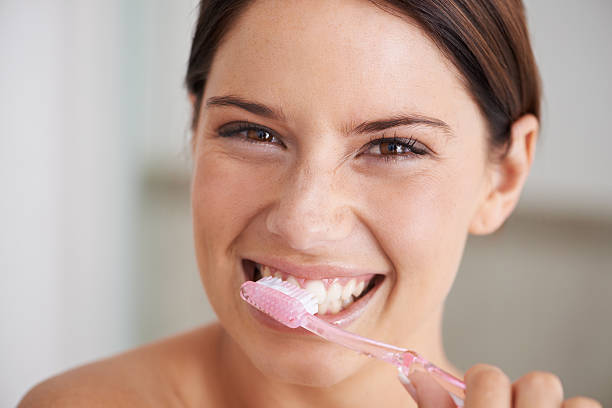There are many aspects involved in proper oral health. Toothbrushes are one of the most basic and essential components to prevent cavities and maintain healthy gums.
They come in different sizes and shapes. However, not all toothbrushes are suitable for you, and some can even damage your teeth and gums if used inappropriately. Therefore, it is vital to understand the difference between different types of toothbrushes to prevent accidental damage while maintaining excellent oral health.
In this article, we will talk about different types of toothbrushes, which ones can cause gums damage, and how to choose the best for you, especially if you have sensitive gums.
Toothbrushes and oral health
Toothbrushes are key elements regarding oral health. Composed of a head where the nylon bristles lie in, and the body that allows you to have a good grip while performing the brushing movements. They are the most fundamental item required to maintain your teeth clean and gums healthy.
However, they can also cause damage to the tissues when not used properly. Combined factors, such as over-brushing your teeth, using an incorrect technique, or using the wrong type of toothbrush can result in dental abrasion and gums recession.
This abrasion will wear off the enamel of the teeth, usually at the cervical portion of the crown. The receding gums will expose the tooth roots, which are covered by sensitive cementum instead of enamel.
Unlike enamel, cementum is less sturdy and resistant. Therefore, excessive brushing on this thin layer can wear it off, leading to hypersensitivity, especially when in contact with cold substances.
Gums recession can be permanent or temporal. When the damage to your gums is not significant, they can get back to their normal healthy state if the toothbrush is changed and a proper brushing technique is applied.
However, if the gums recession is severe, then it won’t be able to repair on its own, and distinct surgical methods will need to be performed by a dentist to fix the irregular gum position.
Thereby, it is vital to understand which are the best toothbrushes to prevent gums recession. It is also essential to comprehend that gums recession associated with brushing is not induced only by the toothbrush but several aspects together.
Different types of toothbrushes
There are many brands in the market with different toothbrush models. However, all of them will come with one of the three types of bristles: soft, medium, and hard.
Aside from the type of bristles, you can also find electric brushes which are usually indicated for people with motor disabilities.
The chief aspect you need to pay attention to when selecting your toothbrush is the bristles.
Hard bristles
Hard bristles tend to be the most harmful of all three types. Their hard surface can easily damage your gums, creating recession and making them more prone to bleed if you already have a preexisting condition, such as gingivitis.
A hard bristle toothbrush is something you want to avoid if your gums are sensitive and hurt when brushing.
Due to their higher abrasive feature, they can be used combined with whitening toothpaste to lighten stains. However, this is not recommended to be done often due to the damage that it can produce when used for prolonged periods.
Medium bristles
Toothbrushes with medium bristles are less harmful to your gums than hard bristles ones. However, this doesn’t mean they are the ideal option. Still capable of inducing gums recession, medium bristle toothbrushes should be used with caution.
Soft bristles
These are the ones most dentists recommend and are less prone to cause gums damage. Despite being soft, they are the best option for everyone looking to maintain good oral health. They allow for a proper brushing technique with little stress over the enamel and gums.
To eliminate plaque and food residues between teeth, it is not necessary to use a hard brush. Plaque is a soft layer that can be easily removed by applying little pressure with a good technique. Therefore, soft-bristled toothbrushes will keep your teeth clean without causing damage.
Due to their gentle nature, they won’t hurt you when brushing if you suffer from sensitive gums. Moreover, you can improve the health of your gums by being able to brush better on those sensitive areas and eliminating what could be causing it.
Electric toothbrush
In contemporary dentistry, many technologies have been developed to aid people in achieving better oral health.
Electronic toothbrushes are one of these inventions. Like their manual counterpart, the head of these brushes can come with hard, medium, or soft bristles. Therefore, it is recommended to use one with soft bristles to prevent gums damage.
Dentists recommend electric toothbrushes to people with motor disabilities or limited mobility.
Dentists recommendations and proper technique
Gums damage is not produced by the toothbrush alone but by a series of factors. If you are having gums problems, the dentist can identify the causes and give you the advice to achieve healthy gums and good oral health, such as:
Stop excessive brushing: No matter how soft your brush bristles are, excessive brushing will always lead to dental abrasion and gums recession. Two or three times a day is enough for excellent oral health.
Do not brush too hard: Excessive force when brushing will also be harmful.
Use the proper technique: It is essential to use the Bass method to brush your teeth. This consists of holding the brush gently against the teeth and gums at a 45-degree angle and then performing short back and forth movements.
Pay attention to your toothbrush: If the bristles are flared out, you need to replace your toothbrush. This can also be an indicator that you are brushing too hard.
Every dentist will recommend soft-bristled toothbrushes and most likely will tell you to stay away from hard bristles variations because of the damage they can cause to your gums. If you have gums sensitivity, a toothbrush with soft bristles could even cease it. Therefore, giving you the oral health you deserve.
